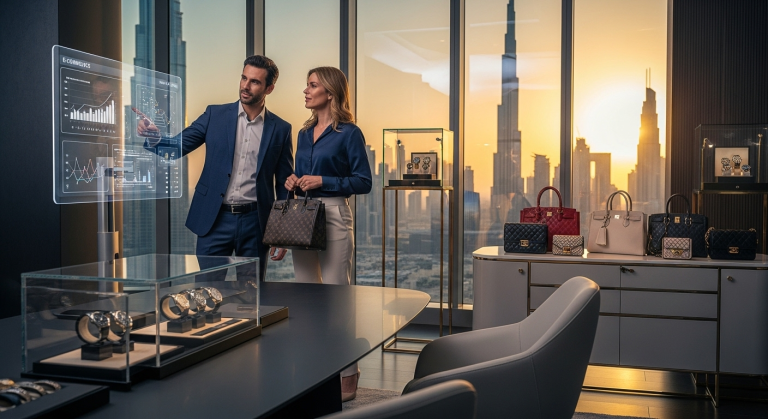Market Analysis and Opportunities
The United Arab Emirates, and particularly Dubai, stands as a prominent global hub for luxury commerce, making it a prime landscape for launching an e-commerce platform focused on luxury goods. Business in Dubai has flourished due to an affluent consumer base, a strategic geographic location, and a robust digital infrastructure. According to recent UAE market analysis, online retail is experiencing double-digit growth, and luxury goods are among the highest-performing sectors, with a projected CAGR of around 8.5% through 2027 (Statista, 2023).
Target Market Analysis
Dubai and the wider UAE are characterized by:
- High purchasing power: Over 35% of Dubai’s population belongs to high-income and ultra-high-net-worth segments.
- Growing digital adoption: Over 99% internet penetration and smartphones among all demographic groups (UAE Telecommunications Regulatory Authority, 2023).
- Young, international population: More than 85% of Dubai’s residents are expatriates from over 200 nationalities, with a strong appetite for luxury goods, exclusive brands, and international trends.
Key industry trends shaping buyer preferences:
- Digital-first shopping: Mobile commerce, virtual showrooms, and AR experiences are increasingly used to replicate in-store luxury experiences online.
- Desire for authenticity and exclusivity: Buyers seek certified products, personalized shopping, and bespoke experiences.
- Sustainability: Increasing preference for brands demonstrating ethical sourcing, transparency, and eco-friendly practices.
Marketing Needs
The luxury e-commerce market in Dubai is highly competitive, necessitating comprehensive market research and robust branding to stand out.
- Market Research: Ongoing consumer trend analysis and competitor benchmarking, including partnerships with local influencers and KOLs.
- Digital campaigns: Cross-channel SEO, Google PPC advertising, and curated Instagram campaigns targeting high-spending segments by interests and location.
- Brand strategy: Visual storytelling and premium content production to boost brand perception and customer loyalty.
To optimize marketing in Dubai’s digital landscape, adopting a data-driven, multi-lingual (English, Arabic, Russian, Mandarin) approach is recommended.
Expansion Potential
The e-commerce platform has robust opportunities to scale within UAE and across the GCC:
- Expand into neighboring emirates (Abu Dhabi, Sharjah) and affluent GCC states (Saudi Arabia, Qatar, Kuwait).
- Diversify beyond B2C to include B2B or B2B2C marketplaces for exclusive partnerships with hotels, travel, and corporate gifting sectors.
- Leverage Dubai as an export base, tapping into Asia, Europe, and Africa via simplified customs and global logistics connections.
Comprehensive Business Overview
The proposed e-commerce platform for luxury goods in the UAE is designed as a marketplace connecting local and international luxury brands with high-net-worth individuals (HNWIs) and discerning residents in Dubai.
- Industry: E-commerce, Luxury Retail, Digital Marketplace
- Business Model: Commission-based or fee-based revenue, with the integration of value-added services like personal shopping, white-glove delivery, and exclusive member rewards.
- Target Audience: HNWIs, expatriates, business travelers, and luxury enthusiasts in the UAE and GCC.
- Operational Scope: Focused on Dubai as an initial base, with logistics, warehousing, and customer service localized for efficiency and premium service delivery.
Mission: To redefine luxury retail in Dubai by offering seamless, secure, and personalized online experiences that mirror the exclusivity and prestige of in-person luxury shopping.
Vision: To become the region’s preeminent digital destination for authentic, high-end goods, fostering a culture of trust, access, and innovation.
Core Objectives:
- Build a curated portfolio of premium brands with validated authenticity.
- Deliver world-class customer experiences through technology, service, and logistics excellence.
- Achieve sustainable market share and expand regionally within three years.
Business Stage and Location:
- Stage: Early-stage startup, positioned for accelerated growth via external investment.
- Location: Dubai Free Zone (e.g., Dubai Multi Commodities Centre – DMCC) to benefit from 100% foreign ownership, tax advantages, and streamlined business setup (Business Setup Services).
Competitive Advantage
Launching an e-commerce platform for luxury goods in Dubai presents unique advantages for founders, investors, and managers.
Entrepreneur Perspective
- Market viability: Dubai’s luxury retail spending per capita is among the world’s highest, ensuring a consistent customer base.
- First-mover/early-mover advantage: While luxury e-commerce is growing, it remains less saturated compared to mainstream products, offering room for innovation and rapid brand recognition.
- Tech leverage: Implementation of proprietary or customized e-commerce platforms with integrated AI for personalization can create significant differentiation.
Investor Perspective
- Attractive ROI: The luxury market’s high margins combined with low taxation structures in Dubai maximize returns.
- Scalable model: Once established, the platform can add categories (jewelry, art), geographies (wider GCC). Digital infrastructure keeps operational costs lean.
- Strategic partnerships: Potential for exclusive distribution agreements with international brands seeking entry into the Middle East market.
Manager Perspective
- Operational efficiency: Access to state-of-the-art logistics, bonded warehousing, and fulfillment partners in Dubai maximizes customer satisfaction and minimizes delivery times.
- Talent pool: Dubai’s cosmopolitan workforce provides access to specialists in luxury retail, digital marketing, and technology.
- Flexible regulations: Free zone operations allow for agility in management and adaptation to market needs.
Financial and Investment Needs
Financial Requirements
Startup and growth costs in Dubai are notably high, but so are the returns for luxury e-commerce platforms. Estimated capital requirements:
- Setup and Licensing (AED 100,000–250,000): Costs for business setup, regulatory approvals, and legal retainer fees.
- Technology (AED 200,000–500,000): E-commerce development, payment integration, customer data security, and app development.
- Infrastructure (AED 150,000–350,000): Warehousing, office leasing at co-working/free zone facilities, and logistics contracts.
- Marketing & Branding (AED 400,000–1,000,000): Digital campaigns, PR events, influencer partnerships, and visual identity.
- Staffing (AED 300,000–600,000): Initial recruitment, training, and remuneration for 10–20 employees across tech, customer service, and marketing.
Investment Potential
The business is highly attractive for investors seeking opportunities in Dubai due to:
- Strong consumer demand and market resilience.
- High average transaction values.
- Relatively low corporate taxation.
Suitable investment models:
- Equity financing from angel investors or venture capital.
- Convertible notes for early-stage funding.
- Strategic partnerships with luxury brands for co-investment.
Explore tailored investment consulting services for bespoke funding and partnership strategies.
Financial Risks and Mitigation
- Cash flow pressures: Initial capital outlays and delayed revenues can stress operations; phased rollout and milestone-based funding can mitigate this.
- Currency fluctuations: AED’s peg to USD provides relative stability, but cross-border purchases may expose the business to risk — hedging strategies and multi-currency payment processing recommended.
- High operating costs: Dubai’s premium infrastructure and promotional spend are significant; cost-sharing partnerships and lean operations will reduce burden.
Human Resources and Recruitment
Workforce Needs
A high-caliber workforce is crucial for luxury e-commerce in the UAE:
- Initial staff: 10–20 employees covering roles in platform development, UX/UI, digital marketing, customer care, logistics, and content creation. High fluency in English and Arabic is essential, with additional Russian or Mandarin speaking staff advantageous.
- Specialized roles: Data scientists, e-commerce operations managers, luxury brand liaisons, and digital marketing experts.
HR Challenges
- Talent retention: Luxury sector staff are sought-after; competitive salaries, performance incentives, and continuous development programs are necessary.
- Cultural compatibility: Balancing international luxury standards with local cultural sensitivities in service and communication.
Strategies:
- Create clear growth paths and training for local and expatriate employees.
- Offer family-friendly packages and housing support for top-tier hires.
Compliance with UAE Labor Laws
- Full alignment with UAE visa processes for expatriates, competitive contractual terms, and compliance with end-of-service gratuities.
- Employee handbooks detailing UAE labor rights, anti-discrimination, and workplace safety protocols are recommended.
Infrastructure and Operations
Infrastructure Needs
- Virtual and physical offices: Leasing in Free Zone co-working hubs offers flexibility and cost-efficiency.
- E-commerce technology: SaaS-based e-commerce platforms, robust payment gateways, advanced cybersecurity, AI for personalization, and real-time analytics.
- Logistics: Partnerships with premium courier services for same-day/next-day fulfillment in the UAE.
Operational Optimization
- Supply chain: Use of third-party logistics and bonded warehouses streamlined via Dubai’s sophisticated ports and cargo hubs.
- Automation: ERP systems for order and inventory management, AI-driven fraud detection, and chatbot-enabled customer support.
Legal Compliance
- Company registration in a Free Zone (e.g., DMCC, Dubai Internet City) for 100% ownership and access to investor-residency visas.
- Regulatory clearances from the Dubai Department of Economic Development (DED) or Free Zone authority depending on business structure.
- Opening UAE corporate bank accounts; KYC and AML regulations strictly followed.
For streamlined navigation, consider business setup services.
Innovation and Technology
The luxury e-commerce platform should integrate:
- AR/VR for virtual product trials, replicating luxury boutique experiences.
- Blockchain-based certificates of authenticity for all products.
- AI-driven personalization engines — recommended for targeted sales and client retention.
- Sustainability tech for supply chain transparency and carbon footprint tracking.
Marketing and Branding Strategies
Brand Status and Positioning
In a market where reputation is everything, visual identity must communicate luxury and trust.
- Professional photography, consistent high-end aesthetics, and clear messaging are essential.
- Brand story and philosophy aligned with the values of exclusivity, reliability, and personalized service.
Areas for improvement:
- Localize branding for multicultural resonance — leverage Arabic, Russian, and Mandarin messaging to increase relatability.
Marketing Channels
- SEO: High-value keyword targeting (e.g., “luxury e-commerce Dubai,” “authentic designer goods UAE”).
- PPC: Targeted Google and luxury lifestyle digital magazine placements.
- Social media: Instagram, LinkedIn, and TikTok collaborations with regional luxury influencers; content marketing via lifestyle blogs and fashion portals.
- Traditional channels: Invitations to exclusive launch events, partnerships with art galleries, luxury hotels, and local media appearances.
For expertise, explore sales and advertising solutions.
360-Degree Campaigns
Cross-channel campaigns can boost platform adoption through:
- Influencer-led launches and product unveilings on social media and at offline events.
- Bespoke member programs and closed VIP previews.
- Integrated email marketing with exclusive offers and luxury content.
Growth and Development Potential
Growth Strategies
- Form exclusive distribution agreements with global luxury brands not yet present in GCC markets.
- Leverage partnerships with local conglomerates, luxury hospitality, and tourism boards to cross-promote offers.
- Invest in regional logistics and warehousing to support rapid expansion to new markets.
Networking
- Engage with Dubai Chamber of Commerce, luxury retail associations, and expat groups for business connections.
- Participate at trade shows like Arabian Travel Market and Dubai Shopping Festival.
- Utilize networks like Persian Horizon for cross-border market access and supply chain synergies (Persian Horizon).
International Potential
Dubai’s logistics, multi-lingual population, and zero-tax regime position it as a launchpad for international e-commerce operations.
- The platform can quickly expand to Africa, South Asia, and Europe via regional fulfillment centers and global marketing alliances.
Sustainability and Innovation
Alignment with Dubai Vision 2030 is crucial for long-term success:
- Adopt sustainable packaging, carbon-neutral delivery, and responsible sourcing policies.
- Integrate blockchain for supply chain traceability and green certifications.
Alignment with Dubai’s Market
Cultural Alignment
Adapting product curation, campaign messaging, and service standards to Dubai’s multicultural environment is essential:
- Multi-language support.
- Celebration of regional traditions and high holidays (e.g., Ramadan, Eid, Diwali, Chinese New Year).
- Respect for local norms in advertising and client relations.
Local Regulatory Compliance
Stay current with UAE commercial, tax, and labor law changes. Regular audits, guidance from local legal counsel, and partnership with trusted consultants ensure uninterrupted operations.
Advantages of Dubai
- Strategic global transport links and a trusted logistics environment.
- Full repatriation of profits with no personal or corporate taxes in Free Zones.
- High safety standards and political stability, underpinning investor confidence.
Local Challenges and Solutions
- High competition: Stand out via unique brand partnerships and investments in digital experiences.
- Operational costs: Begin lean, utilize co-working spaces, and scale infrastructure as volume grows.
- Brand trust: Transparent certification and guarantees, white-glove fulfillment, and embedded client care services.
Conclusion
Dubai’s position as a nexus for regional and international luxury commerce, coupled with a digitally-savvy, affluent market, presents a compelling opportunity for an e-commerce platform devoted to luxury goods. While competition and setup costs merit careful planning, the city’s infrastructure, investor climate, and logistics advantages enable sustainable growth. Entrepreneurs and investors who commit to authenticity, customer-centric innovation, and regulatory compliance will find significant rewards.
Actionable Recommendations
- Engage a Dubai-based business consultancy to expedite market entry (Persian Horizon’s Services).
- Invest in digital platforms that provide seamless, immersive, and secure purchase experiences.
- Build partnerships with luxury brands and regional logistics leaders for first-mover advantage in underserved sub-markets.
- Pursue regular market research and brand audits to adapt rapidly to shifting trends in the UAE luxury landscape.
- Explore regional expansion leveraging Dubai’s global trade advantages.
For more insights, latest trends, and professional support on launching or scaling your luxury e-commerce venture, visit our blog or consult Persian Horizon’s dedicated services. Empower your UAE business ambitions and seize the next opportunity in luxury e-commerce by harnessing one of Dubai’s fastest-growing digital sectors.







